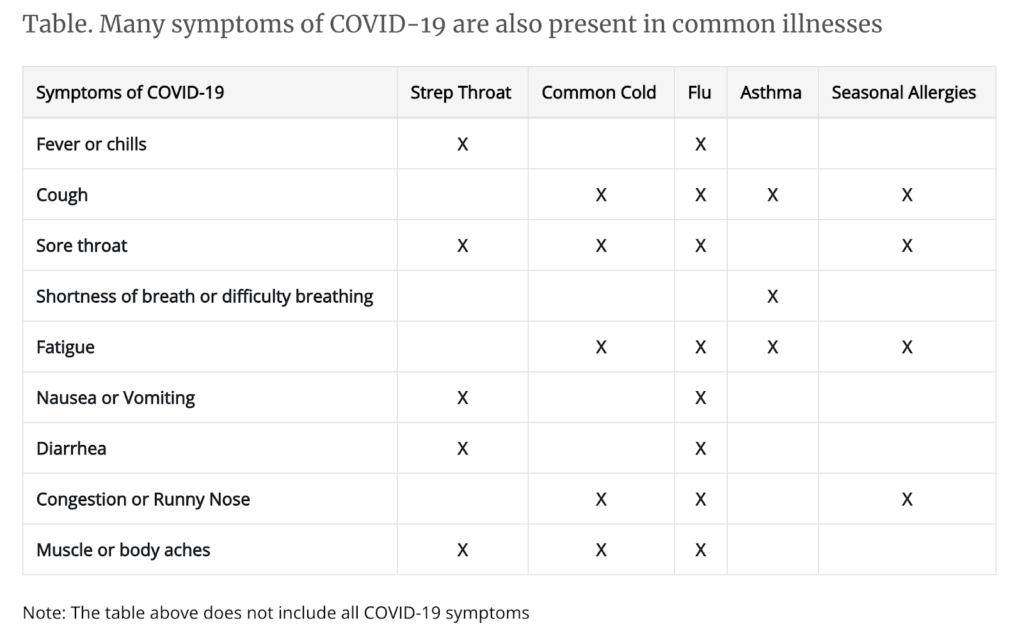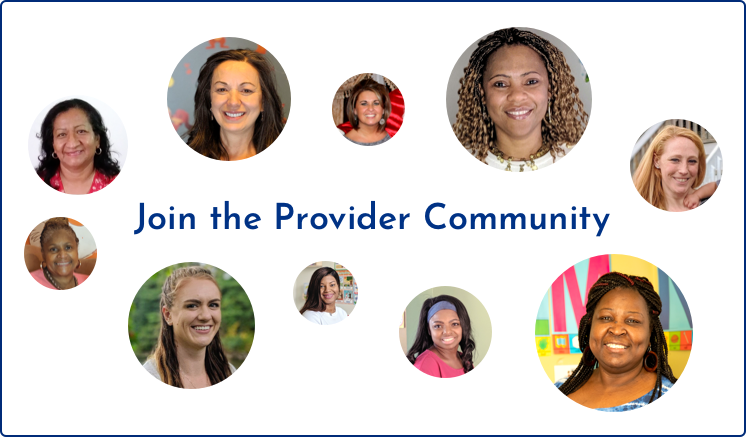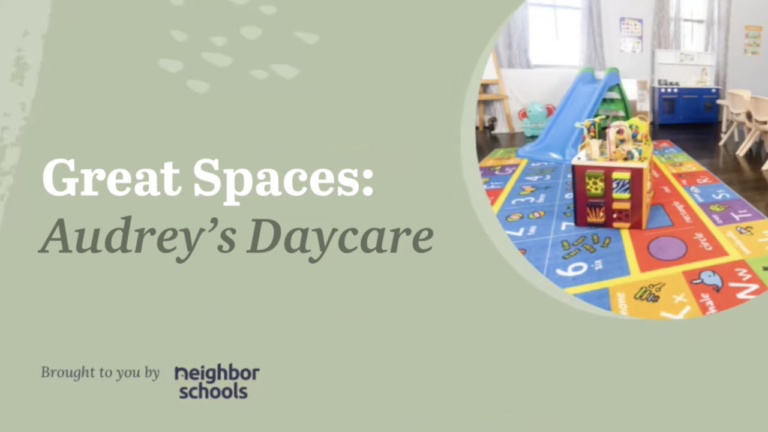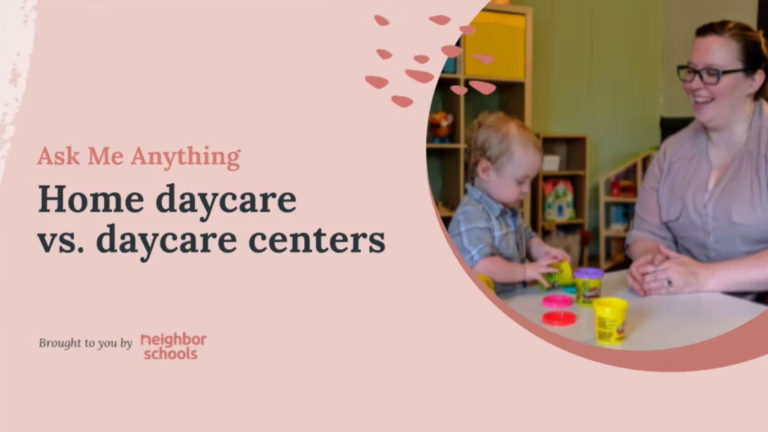Every day, FCC Providers are grappling with Covid-19 health and safety concerns. There are so many unanswered questions. Even 30 pages of state rules and guidelines haven’t addressed the countless situations that pop up every day when caring for infants and toddlers.
As one Provider recently told us: “they tell me to call the Board of Health, but no one answers, and even if they do, they don’t have the answer I need!”
Enter Dr. Katherine Hsu. Dr. Hsu is a pediatric epidemiologist in Boston and the leading expert in Massachusetts on all things related to children and child care during Covid-19. Her take on this? There’s a lot of doubt and misinformation flying around right now, but child care Providers have amazing intuition when it comes to doing what’s best for the children in their program.
To answer the hardest questions around Covid-19 in child care today, Dr. Hsu joined last week’s Nap Time Zoom with 30+ NeighborSchools Providers for a face-to-face discussion.
Here are the top 3 questions she answered, but there’s a lot more in the full video—watch it now.
Question 1: What do I do if a kid in my program has a runny nose or a cough, but the parents say it’s just allergies?
Let’s face it—dealing with runny noses, low fevers, and coughs is par for the course when it comes to child care.
It can feel unnecessary and disruptive to send a child home for mild symptoms like these, but according to Dr. Hsu, you can’t take any chances.
“You need a diagnosis before you make a decision,” says Dr. Hsu. “This is child care’s ‘new normal’ — you can’t guess anymore.”


If a child has any new symptom on the table above, they should not enter your FCC. They should be taken to a clinician to get a confirmed diagnosis, or go to a Covid testing site to rule out the virus.
Once you get a doctor’s note or a test result explaining the situation, and if it isn’t anything too serious, the child can return to care after the symptom eases up.
It’s also possible a parent could feel wary about their kid receiving a Covid test, especially if they’ve heard stories about how uncomfortable it can be. But Dr. Hsu says Covid tests are improving quickly, and parents can find tests that are less invasive than the ones we were hearing about back in the spring.
If you’re a Provider in Massachusetts, Dr. Hsu says to tell your parents to use the state’s online Covid-19 Test Site Locator to find a test site near them.
The locator has a lot of great information, but it doesn’t include each site’s test turnaround time. Dr. Hsu says this is a crucial component for parents who need a test. A faster result means the quicker the child can return to care. She recommends parents call each site to ask for their turnaround time, but she also has a tip: hospitals and their affiliated urgent care clinics might be their best bet since they have to act quickly.
Question 2: What if I can’t reach my local board of health?
A few weeks ago, we heard a lot of Providers in Massachusetts were having trouble connecting with their local boards of health. They felt frustrated since that’s the action the health & safety guidelines told them to take if they needed help dealing with a potential Covid case in their program.
We brought this up to Dr. Hsu. She says right now, any Board of Health is slammed. They have to prioritize critical cases. But if you have an urgent situation and are persistent, they will most likely respond.
Here’s what qualifies as an urgent situation:
- You, a child, or a staff member in your FCC has tested positive for Covid
- You, a child, or a staff member was directly exposed to someone who tested positive for Covid. This means being within 6ft of someone with a confirmed positive Covid diagnosis for more than 10-15 minutes.
But let’s say you’ve called several times—and now it’s 5 PM and you still haven’t heard back. Dr. Hsu says there is a backup service you can use. You can call the Massachusetts Bureau of Infectious Disease and Laboratory Sciences (BIDLS) at 617-983-6800 and press “3”. It’s available 24/7, and you can connect directly to a state Epidemiologist who will help you figure out a plan before the next day of care.
If you reach their answering machine, you should still leave a message, but Dr. Hsu says they will return your call.
Question 3: When is it appropriate to tell other parents that a child in my program is sick?
When it comes to Family Child Care, family is key. So, when one child in your program gets sick, you might want to give the other parents a warning if it’s something serious. Plus, in Massachusetts, the guidelines say, “In the event that a program experiences an exposure, programs must notify the following parties while maintaining confidentiality.” So, you can’t take any chances, right?
Not so fast, says Dr. Hsu. An “exposure” in this case doesn’t include the common cold or strep throat. She says you should only tell parents when a child has a confirmed, notifiable disease—like Covid or measles. And at that point, you probably are already in contact with your local Board of Health and working with them on the proper communication plan.
But she also understands how tight-knit your program can be and why not telling parents can weigh heavily on your mind. She stresses that it’s simply not fair to anyone in your program to say anything until there’s an absolute confirmation.
Think about it. Because FCCs are so small, words can travel fast, and it can be hard to maintain confidentiality despite your best efforts. That puts the family at the center of the conversation in an uncomfortable position. You can lose their trust, and it can create unnecessary panic and worry for the other families in your program.
“We can do this together.”
Dr. Hsu says there’s no doubt about it, being a Provider right now is extraordinarily tough. Information about Covid is spreading like wildfire. It’s dizzying to keep up with everything, even for her.
But she knows that if anybody can persevere during this difficult time, Providers can.
In the last minute of the call, Dr. Hsu gave our Providers an inspiring message. It was too valuable to cut down into a simple quote or break down into text. Instead, you should watch the clip below and hear it for yourself:
Resources from Dr. Hsu
FAQ on Coronavirus Testing Types
Parent FAQs about School Reopening, COVID and Mask Wearing
Pediatric Decision Tool on COVID Testing
Hear more from Dr. Hsu
We know there’s a *ton* more Providers want to know about health & safety. That’s why we asked Dr. Hsu a bunch of more questions, including:
- Which symptoms do I need to look out for the most?
- If a co-worker of a parent tests positive for Covid, what should I do?
- If a child comes into direct contact with someone who tests positive for Covid, do I have to close?
- Will HEPA filters help keep the virus out of my FCC?
- Is a rash a sign of Covid?
Fill out the form below to find out Dr. Hsu’s answers to these 5 questions.






